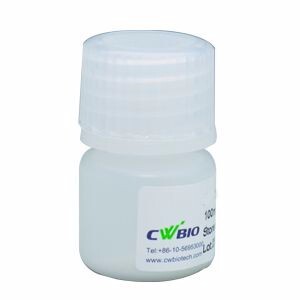
Mail
|
Search


Lysozyme
Lysozyme is an enzyme that destroys bacterial cell walls and improves the efficiency
of protein or nucleic acid extraction. By hydrolyzing the β-1,4 glycosidic bond between
n-acetyl-muricylic acid and n-acetyl-glucosamine in cell wall, the insoluble
mucopolysaccharide is decomposed into soluble glycopeptides, and the contents of
the broken cell wall are induced to escape and dissolve bacteria. Gram-positive
bacteria (G+) are very sensitive to lysozyme because of their high content of
peptidoglycan in their cell walls. Conversely, Gram-negative bacteria (G-) are less
sensitive. When EDTA is contained in the system, Ca2+ in the bacterial outer
membrane can be chelated and G- sensitivity can be improved. In addition, when
lysozyme is used to crack Escherichia coli, the efficiency can be improved significantly
when nuclease such as DNase Ⅰ is added.
Project Inquiry
- Advantages
- Specification
- Manual
Storage condition: -20℃.
Days of preservation: 730 days.
Transport conditions: <10℃.
Application: This product is suitable for bacterial cell wall degradation, protoplasmic preparation, bacteriolysis, sample preparation before nucleic acid separation and pharmacological research.
Days of preservation: 730 days.
Transport conditions: <10℃.
Application: This product is suitable for bacterial cell wall degradation, protoplasmic preparation, bacteriolysis, sample preparation before nucleic acid separation and pharmacological research.
| Catalog number | Specifications |
| CW0887S | 100 mg |
Nucleic Acid Release Reagent
Download RightNow